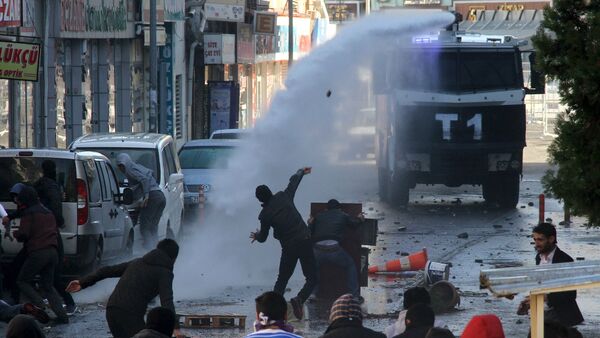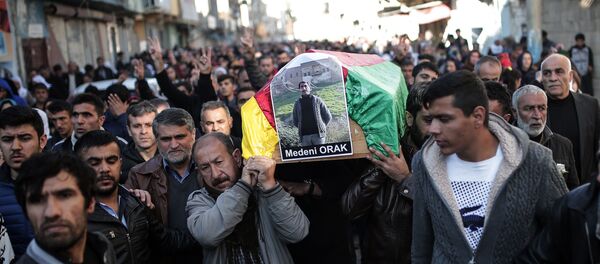In June 2015 after the People’s Protection Units (YPG), the armed wing of the Syrian Kurdish Democratic Union Party (PYD), seized the town of Tell Abyad on the Turkish border, Turkey drew a red line allowing it to connect the Kurdish cantons of Kobani and Jazira.
According to the columnist the western side of the red line was held by Daesh (Islamic State) with the 90-kilometer border stretch from Jarablus westward as the groups only lasting land link with the outside world.
“On the eastern side of the red line, i.e., the Euphrates’ eastern bank, the Kurdish canton of Kobani was controlled by the PYD, the Syrian extension of the Kurdistan Workers Party (PKK), which Turkey is battling on its own territory. Ankara’s red line was meant to hold back the PYD, not IS,” Gursel wrote in his article.
Turkish decision makers have labeled PYD more dangerous than Daesh and had the PYD crossed the border to advance to the western bank of the river to expel the militants from Jarablus it would have greatly annoyed Ankara, noted the columnist.
It has become a known problem for the rest of the world that Ankara constantly postpones to do its part in the struggle against Daesh.
“One key reason why Ankara saw the PYD as a threat greater than IS was its fear of the geopolitical risks bound to arise if a long stretch of Syrian territory along the border, running westward from Iraq, fell under the control of a Kurdish organization affiliated with the PKK, which is considered a threat to Turkey’s unity,” noted Gursel.
Similarly Ankara was concerned that in the Kurdish cantons the PYD would reinforce its own Kurd’s drive for autonomy.
On Dec. 26, the Democratic Society Congress (DTK), an authority organization for Kurdish civic society groups, assembled an emergency meeting in Diyarbakir.
Speaking at the gathering, Selahattin Demirtas, the co-chair of the Kurdish-dominated Peoples’ Democratic Party, said, “This resistance will lead to victory. The Kurds from now on will hold the political will in their lands. The Kurds will perhaps have an independent state, a federal state, cantons or autonomous regions.”
Although the DTK decision seems hardly applicable today, it is important for demonstrating that autonomy will be the minimal condition the Kurdish movement will implement in any future settlements.
So far, President Recep Tayyip Erdogan has sworn that the PKK militants will “choke in the ditches” they have dug in residential areas to keep the security forces away.
The co-chair of the PKK-dominated Kurdistan Communities Union (KCK), Cemil Bayik responded in kind last week. “No reason exists currently to end the armed struggle. Rather, the civil war in Turkey will intensify in the coming months,” he said, Al-Monitor reported.
As the columnist pointed out, sustaining the war between the PKK and the government forces threatens to get spiral out of control for both sides. “As a result, whatever the consequences of the grave developments that would take place, Turkey’s real red lines, its borders, might be opened up for discussion,” noted Gursel.




